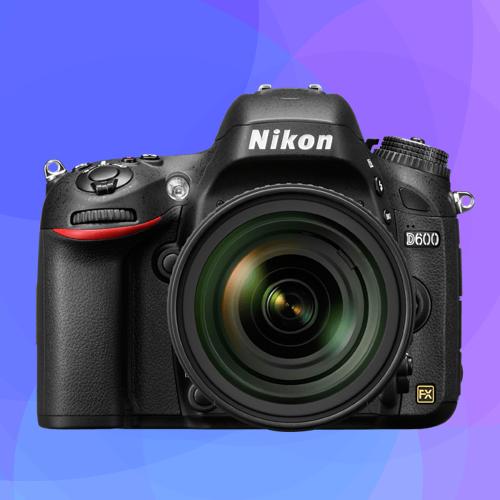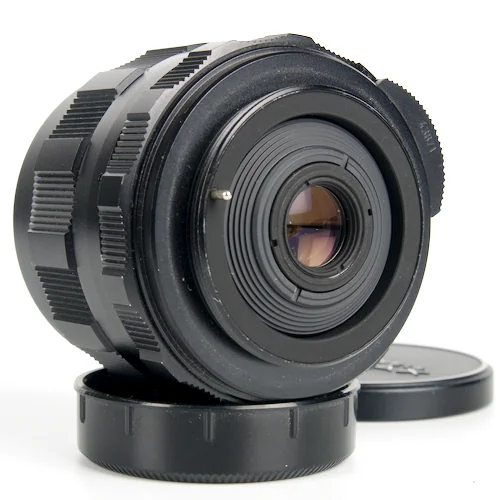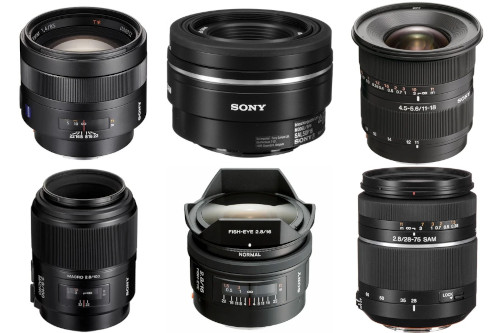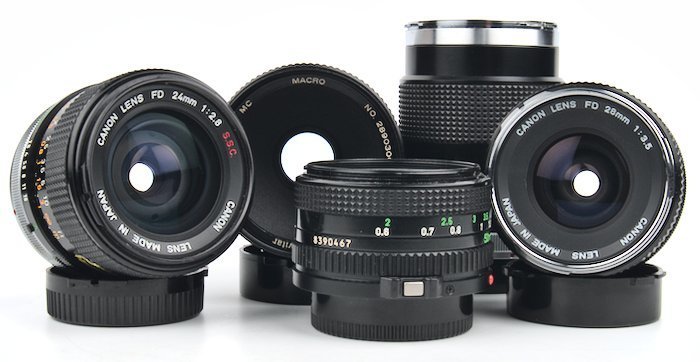
The 5 Best Canon T50 Camera Lenses
- Nathaniel Stephan
- Canon t50
- March 17, 2020
Table of Contents
The Canon T50 is a great film camera.
This post will go over the top 5 lenses for the T50 camera.
Affiliate Advertising Disclosure
Outside the Shot is a participant in the Amazon Services LLC Associates Program, an affiliate advertising program designed to provide a means for sites to earn advertising fees by advertising and linking to Amazon.com.
As an eBay Partner, I may be compensated if you make a purchase. I also participate in affiliate advertising programs with KEH and Adorama. More can be found on the Affiliate Disclosure page.
Additional details are below, however if you’re short on time, here’s the list:
- Kit Lens - Canon FD 50mm f/1.8 (eBay)
- Wide Angle Lens - Canon FD 28mm f/3.5 (Amazon)
- Portrait Lens - Canon FD 100mm f/2.8 (Amazon)
- Zoom Lens - Vivitar Series 1 70-210mm f/3.5 (eBay)
- Macro Lens - Vivitar 90mm f/2.8 (eBay)
Kit Lens and Standard Primes
Canon FD 50mm f/1.8
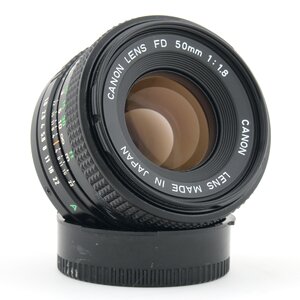
If you don’t already have it, your first lens should be the original “kit lens” for the T50, the Canon FD 50mm f/1.8. The 50mm f1.8 is budget-friendly, easily found for sale online, and has wonderful picture quality.
- The “classic” setup as it can be considered the original kit lens.
- Unbeatable value.
- Light and compact.
- Widely available and easy to find in good condition.
- Uses 55mm filter threads.
Check a variety of places to find the best condition and price.
See current price and more information on:
For a 50mm lens of photography, the 50mm focal length is an excellent choice. The aspects of photography include everyday use, travel, landscapes, portraits, street, and architecture. This is the most widespread focal length that is paired with the T50.
In terms of weight and size, the lens is light, well balanced, and small. Based on on the version of the lens, it will weigh between 170-305g. If you want the lightest lens, purchase a new FD version.
You can also find 2 faster versions of the 50mm lens in a FD mount.
Canon FD 50mm f/1.4
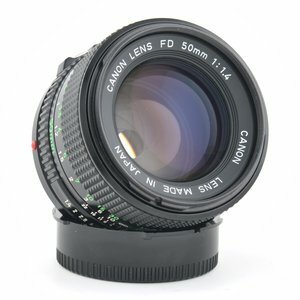
The Canon FD 50mm f/1.4 is 2/3 of a stop faster, but that comes at the cost of additional weight. It is not that much more expensive than the f1.8.
- Excellent image quality.
- Optical multi-coatings.
- Fairly easy to find in good condition.
- Larger and heavier than the f/1.8.
The 50mm f/1.4 comes in 4 copies. The “new FD” copy is the newest and lightest out of the choices.
See current price and more information on:
A hefty, big, and hard to focus lens. Do not expect sharp photographs when shot wide open. If you stop the lens down to f/1.8 or f/1.4 you will not see a great deal of difference between it and the other lenses.
The two versions of the lens are pricey. Optical superiority is not why the lens is expensive. People want the lens due to collectibility and rarity.
Alternative Standard Lenses
If the 50mm focal length isn’t what you like, here are some other alternatives. Count upon having to spend additional money than you normally would for a 50mm lens with a comparable aperture.
- Canon FD 35mm f/2 SSC
- Canon FD 35mm f/2.8
- Canon FD 35mm f/3.5
- Canon FD 55mm f/1.2
Wide Angle Lens
Canon FD 28mm f/3.5
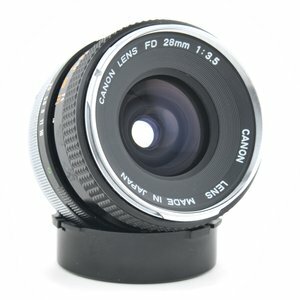
A sought after focal length for street photography is 28mm. However, lenses that have a larger field of view than 28mm are favored for architectural and landscape photography.
- Great combination with a 50mm lens.
- Optical multi-coatings.
- Inexpensive and widely available.
- Small and light.
See current price and more information on:
My recommended choice is the Canon FD 28mm f/2.8 on account of the low price, wide availability, and terrific optics.
Alternative Wide Angle Lenses
In terms of price, the relationship is straightforward. The larger the field of view, the pricier the lens will likely be. Faster versions also go for considerably more.
Weight will vary based on the characteristics of the lens. You can get lenses from 170g to 500g. Faster apertures will also mean that those lenses will physically be large and cause the camera to feel unbalanced.
- Canon FD 7.5mm f/5.6 Fisheye
- Canon FD 14mm f/2.8L
- Canon FD 15mm f/2.8
- Canon FD 17mm f/4
- Canon FD 20mm f/2.8
- Canon FD 24mm f/1.4
- Canon FD 24mm f/2
- Canon FD 24mm f/2.8
- Canon FD 28mm f/2
- Canon FD 28mm f/2.8
Portrait & Telephoto Lens
Canon FD 100mm f/2.8
The 85mm lens wasn’t as widely used when the T50 was originally introduced to the market. Rather, the 135mm focal length was the go to lens for portraits.
- Excellent portrait lens.
- Less expensive 85mm alternative.
- Great value.
- Inexpensive.
See current price and more information on:
If you want to take portrait photos with the T50, there are a bunch of short telephoto lenses to select among. The 100mm f/2.8 lens is one of the most economical choices readily available.
An 85mm lens will have the highest price, with 135mm lenses making up the middle of the price bracket.
Seeing that all of the Canon FD telephoto lenses are manual focus, they are much more compact than autofocus versions. Needless to say, professional lenses like the Canon FD 85mm f/1.2L is going to be big and hefty because of the amount of glass in the lens.
Expect to see very low prices for the Canon FD 100mm f/2.8. There’s also a 100mm f/4 macro version of the lens. It will certainly cost more and is not the best option for portraits as it ought to be stopped down.
Alternative Telephoto Lenses
Another option, the Canon FD 135mm f/2.8 is one of the least expensive prime lenses you can purchase. You will have to dig through a great number of listings for thirdparty 135mm lenses that aren’t going to be anywhere close to as good as a Canon lens.
There are multiple 85mm lenses to pick from. The best is the Canon FD f/1.2L lens. A more affordable option is the Canon FD 85mm f/1.8 lens, but it is still relatively less affordable than the various other telephoto lenses above.
- Canon FD 85mm f/1.2L
- Canon FD 85mm f/1.8
- Canon FD 100mm f/2
- Canon FD 135mm f/2.5
- Canon FD 200mm f/2.8
- Canon FD 200mm f/4
T50 Zoom Lenses
Canon FD 35-105mm f/3.5 & Vivitar Series 1 70-210mm f/3.5
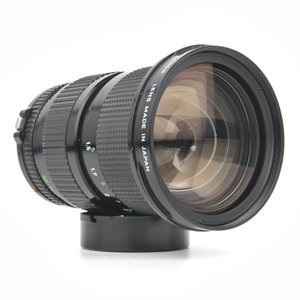
The usefulness of partnering a T50 with a zoom lens is appealing. Having the capability of using a range of focal lengths without the need to switch a lens is advantageous.
Be aware that all of these are vintage zoom lenses.
- Haze and or Fungus
- Large amount of dust in the lens
- Loose or tight zoom ring
- Loose or tight focus ring
- Oil on the aperture blades
- Decentered lens elements
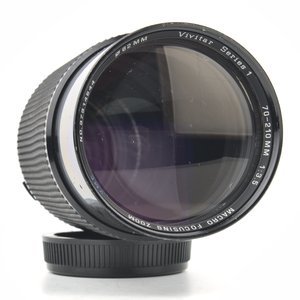
Additionally, you need to keep in mind the drawbacks the lenses have even when in excellent condition.
- Image quality will not be good when shot wide open.
- One or both ends of the focal range may suffer from a large amount of distortion.
- Zoom lenses are larger and generally heavier than primes.
Alternative Zoom Lenses
With regards to cost, most vintage zoom camera lenses will likely be bargain priced.
- Canon FD 70-210mm f/4
- Canon FD 80-200mm f/4L
- Canon FD 28-85mm f/4
Macro Lens
Vivitar 90mm f/2.8 & Vivitar 55mm f/2.8
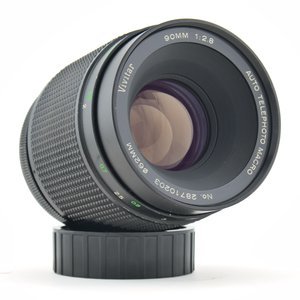
- My favorite vintage macro lens.
- Available in multiple lens mounts.
- Incredible value.
- Sharp corner-to-corner at f/8.
See current price and more information on:
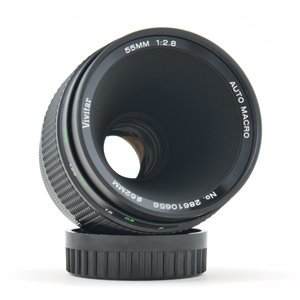
- My second favorite vintage macro lens.
- An excellent choice for close-up photography.
- It does not need an extension tube to reach 1:1 magnification.
See current price and more information on:
The two suggested macro camera lenses were built by Komine in Japan. The lens was also sold under many different brand names. Elicar, Quantaray, Panagor, Spiratone, and Rokunar are names you will probably find on a copy of the lens.
There is a Vivitar 90mm f/2.8 Macro Lens Review and a Vivitar 55mm f/2.8 Macro Lens Review.
For capturing pictures at lifesize magnification (1:1), the 90mm lens will most likely be the better choice because it has a greater working distance.
The 55mm lens is top notch for close-up and table-top photography.
Alternative Macro Lenses
- Canon FD 50mm f/3.5
- Canon FD 100mm f/4
- Canon FD 200mm f/4
Used FD Camera Lens Prices
Prices are continuously changing. During the past few years, involvement in film photography has been rising. Because of that, price ranges have steadily gone up.
The smartest option is to check out pricing from a number of websites. Immediately buy a really good price when ever you see one simply because the best deals sell the fastest.
What Lens Mount Does the Canon T50 Use?
The T50 works with the Canon FD lens mount. Canon used the FD mount for film cameras released from 1971 until 1992.
Here is a list of all the cameras that have a Canon FD mount.
The Canon FL lens mount was preceded by the FD mount, which was implemented between 1964-1971. FL mount lenses are compatible with the T50, but you will be required to use stopped down metering.
Standard Lens Cap Size
The standard lens cap and filter ring thread diameter for Canon FD lenses is 55mm.
Making use of a standardized filter thread size is useful due to the fact that you just need to get hold of and carry a single set of filters.
Some telephoto and zooms have bigger filter ring thread diameters since they have substantial front lens elements.
FD vs FL Lens Mount
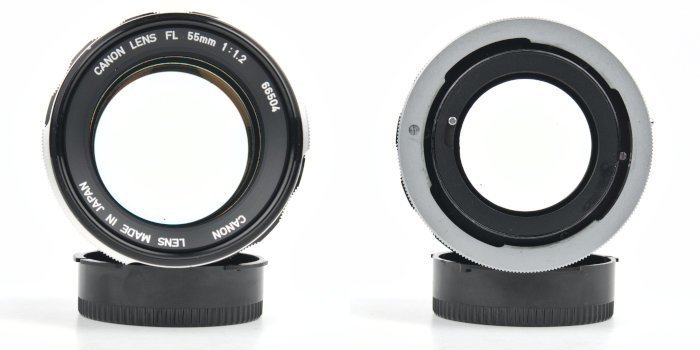
The Canon FL mount was made prior to the FD lens mount. You are able to use FL mount lenses on the FD mount, and FD mount lenses can be used on the FL mount.
What Canon FL mount lenses do not have the feature to do auto stop-down metering. This means that the an FL lens have to be stopped down by pressing the depth-of-preview switch in order for the T50’s light meter to show the proper reading.
FD vs new FD Lenses
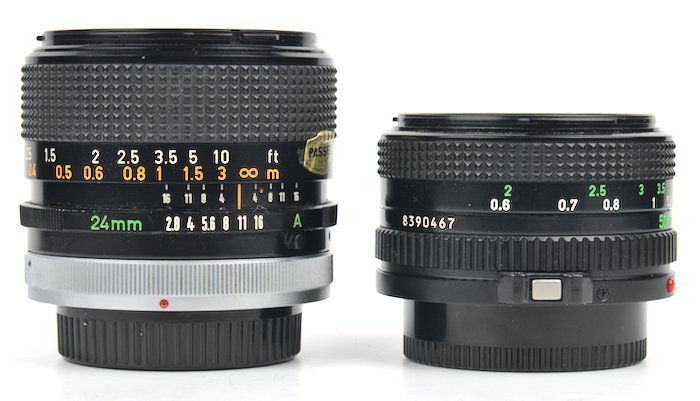
The whole new FD lens rotates to lock onto the camera. While original FD lenses have a breech-lock ring at the rear of the lens that must be tightened to be able to mount a lens to the camera.
FD and new FD lenses are interchangeable with each other. There are no compatibility issues.
Occasionally you will find new FD lenses referred to as FDn lenses.
The switch in the design of the breech-lock ring was owing to complaints. A small number of camera owners suffered from lenses getting jammed on a camera mount.
If you have not put on an FD mount lens to a camera body, don’t be concerned. Simply take the process slow and do not force anything.
Telling FD and FDn Lenses Apart
It is easy to tell FD and new FD lenses apart. New FD lenses are going to have a silver button on the barrel of the lens, near the mount.
The original version of FD lenses have a ring that needs to be rotated after the lens is put on the camera to lock it into place.
